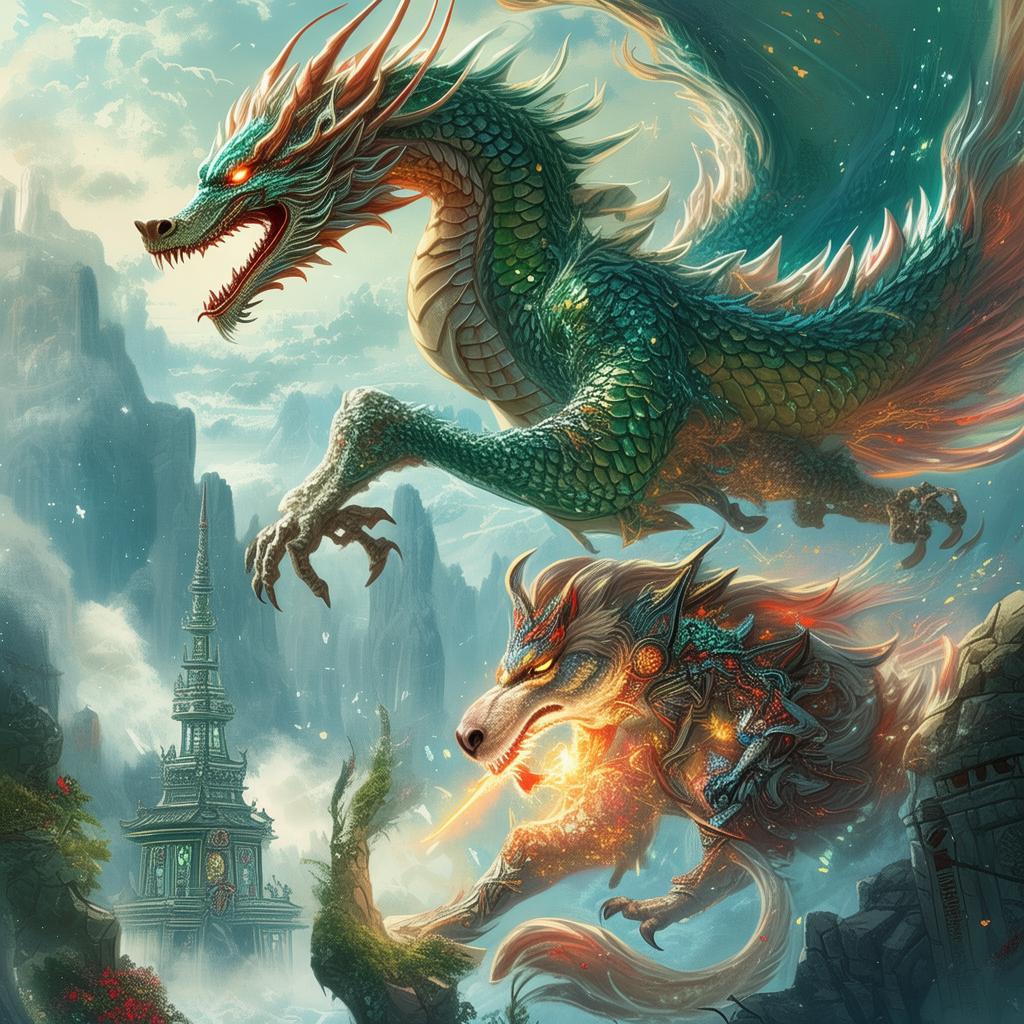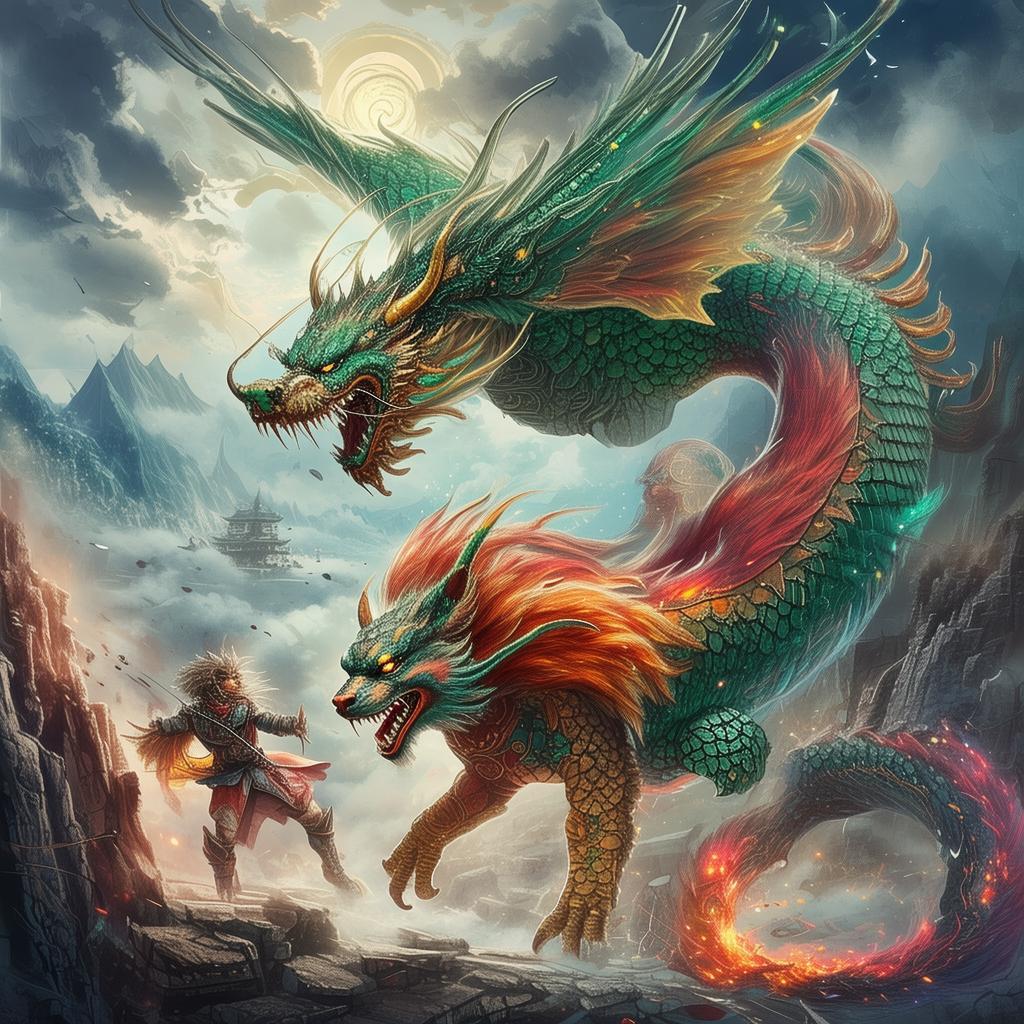Mountains of Vengeance: The Hidden Treachery of Kunlun’s Peak
In the heart of the mythical Kunlun Mountains, where the heavens touch the earth, a hidden treachery lay dormant within the ancient, gnarled trees and swirling mists. It was a tale whispered among the elders, a story of betrayal and retribution that had been long forgotten by the world below. Yet, in the year of the Black Tortoise, a young warrior named Liang would be the catalyst that would set the long-buried enmity into motion once more.
Liang was a man of few words and many scars, his eyes a mirror to the tumultuous peaks that surrounded him. His father, a revered guardian of the Kunlun, had been poisoned by a rival sect, and the blame fell upon the Mountain’s most venerated elder, Master Feng. But the proof was thin, and the sect was too powerful to challenge. Liang’s life was a constant struggle to prove his father’s innocence and exact justice.
One evening, as the moon hung low over the peaks, Liang received a mysterious message. It was a scroll, wrapped in a cloth of the most vibrant blue, and it spoke of a hidden chamber beneath the Great Kunlun Temple. According to the scroll, the chamber held the truth that would clear his father’s name and unravel the conspiracy that had plagued the mountains for generations.
Determined to uncover the truth, Liang ventured into the temple, a place he had visited countless times in his youth. The temple was a marvel of ancient architecture, with intricate carvings and towering pillars that seemed to whisper secrets of old. But the chamber was a mystery, hidden behind a door that was not of this world, adorned with symbols that spoke of a realm beyond human understanding.
With each step closer to the door, Liang felt the weight of his father’s legacy pressing upon his shoulders. He reached the door and, with a deep breath, pushed it open. The chamber was a cavernous space, filled with ancient artifacts and a single pedestal in the center, upon which rested a scroll as old as the mountains themselves.
As Liang unrolled the scroll, the words danced before his eyes, revealing the intricate web of deceit that had ensnared his father. It spoke of a pact between Master Feng and the sect leader, a deal that would have seen the sect’s rise to power at the cost of Liang’s father’s life. But there was more. The scroll spoke of a hidden weapon, a weapon that could bring down the sect and restore balance to the mountains.
Liang knew that the weapon was no ordinary artifact. It was the Heart of Kunlun, a gemstone that held the essence of the mountains’ ancient power. To wield it was to control the very elements, to become a deity among mortals. But with great power came great responsibility, and Liang was not the man to bear such a burden.
As he pondered his next move, a figure stepped out of the shadows. It was Master Feng, his once-elderly face now twisted with guilt and fear. “You have found it,” he said, his voice trembling. “But know this, the Heart of Kunlun is a dangerous thing. It will consume you if you are not careful.”
Liang, his mind racing, knew that he could not take the Heart alone. He needed allies, people who could understand the gravity of the situation and the responsibilities that came with wielding such power. He turned to the temple, seeking out those who might share his cause.
He found them in the most unexpected places: a reclusive herbalist who knew the secrets of the mountains, a young monk who had a knack for uncovering hidden truths, and an old warrior whose own life had been touched by the sect’s corruption. Together, they formed a unlikely band of rebels, each bringing their own skills and motivations to the cause.
As they ventured deeper into the mountains, they encountered trials that tested their resolve and their friendship. They faced the wrath of the sect, whose leaders were determined to keep the Heart of Kunlun out of the wrong hands. They encountered spirits of the mountains, both benevolent and vengeful, who had their own stake in the outcome of their journey.
In the end, it was not the power of the Heart that would decide the fate of the mountains, but the strength of their bonds. As they stood at the precipice of a battle that would define their destinies, Liang realized that the true weapon was not the Heart of Kunlun, but the unity and courage they had found in each other.
With a united front, they faced the sect’s leaders, their combined strength overwhelming the enemies. The Heart of Kunlun was used not as a weapon, but as a symbol of unity, its power harnessed to restore balance to the mountains and bring peace to the land.

Master Feng, his guilt finally acknowledged, stepped aside, allowing Liang to take his place as the new guardian of Kunlun. The sect was dismantled, and its power redistributed among the people. The mountains were once again at peace, and Liang’s name was etched into the annals of history as a hero who had stood up against tyranny and brought justice to the land.
In the end, Liang realized that the greatest victory was not in defeating his enemies, but in finding the strength to face them and the courage to forgive. He looked upon the tumultuous peaks of the Kunlun Mountains, knowing that they were a testament to the power of unity and the enduring spirit of those who dared to challenge the status quo.
Mountains of Vengeance: The Hidden Treachery of Kunlun’s Peak is a tale of ancient Chinese mythology, where the power of the mountains, the strength of friendship, and the courage to seek justice are brought to life in a story that resonates with the heart and the soul.
✨ Original Statement ✨
All articles published on this website (including but not limited to text, images, videos, and other content) are original or authorized for reposting and are protected by relevant laws. Without the explicit written permission of this website, no individual or organization may copy, modify, repost, or use the content for commercial purposes.
If you need to quote or cooperate, please contact this site for authorization. We reserve the right to pursue legal responsibility for any unauthorized use.
Hereby declared.









